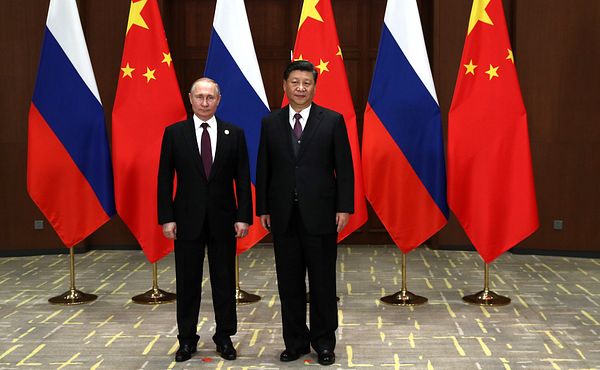
Years after a very public breakup, they’re back together again. Ben and Jennifer? No: Russia and China.
In recent U.S. strategic planning documents, Russia and China have been presented as a joint threat to U.S. power and prestige. That connection was readily apparent in President Joe Biden’s most recent trip to Europe. At all three of Biden’s high-profile engagements in June – including the G-7 summit in the U.K., the NATO summit in Brussels, and the one-on-one meeting with Russian President Vladimir Putin in Geneva – China and Russia were rarely far from the discussion.
Most analysts focus on Beijing and Moscow’s growing economic ties, shared ideological interests, or the personal relationship between Putin and Chinese leader Xi Jinping. In turn, they also offer advice on how to break up this happy Eurasian couple. But 2021 polling by the Chicago Council and Levada-Center finds that Russians themselves see their relationship with China as a beneficial one.
On the surface, it makes sense that Russia and China would make common cause. The two nations’ visions for international order have more in common with each other than with the United States, with Moscow and Beijing preferring to emphasize national sovereignty and noninterference (in their own affairs, if not in the affairs of others). The two have shared economic interests, with China serving as a market for Russian oil and a source of foreign investment at a time when sanctions from the West have cut off other sources.
Beijing and Moscow have also made very public shows of their mutual affection. This spring, Russian Foreign Minister Sergey Lavrov described Sino-Russian cooperation as “close and fruitful in virtually all spheres” and “a vital factor in international affairs.” For his part, Chinese Foreign Minister Wang Yi described the relationship as being better than an alliance, saying the two would “always be each others’ strong backers.” Putin and Xi also share a strong personal relationship, often demonstrated in public. And last month’s Zapad/Xibu joint military exercises aimed to highlight the two countries’ military interoperability.
But for all the pageantry and public displays of solidarity between Xi and Putin, experts have often questioned the Sino-Russian rapprochement. Isaac Stone Fish, writing in the Washington Post, argued that “Moscow has more to fear from Beijing than Washington,” pointing to Russia’s loss of influence in Central Asia, growing Chinese economic influence within Russia, and potential territorial disputes in Russia’s Far East. Others argue that while Putin and Xi certainly make a strong showing of rapport, there’s less to the partnership than meets the eye. As Gabriel Gavin put it in The Diplomat, “Despite the warm rhetoric, the reality of Sino-Russian diplomacy is that it runs a mile wide and an inch deep.”
Certainly Xi and Putin have a strong public relationship. But the growing Sino-Russian ties aren’t just supported by the two leaders. As surveys conducted by the Chicago Council with Levada-Center in Russia shows, the relationship is bolstered by a deeper level of support among the Russian public.
Unlike many publics around the world, most Russians (74 percent) feel favorably toward China. Moreover, a majority of Russians (53 percent) have a positive view of Xi Jinping. That’s a lot warmer than Russian views of either former U.S. President Donald Trump (26 percent) or current President Biden (19 percent); of the leaders asked about in the survey, only Putin himself is more popular with Russians (66 percent). Russians also see China as a capable country on the rise. A majority (55 percent) say China is more respected in the world than a decade ago; only four in ten (41 percent) say the same about Russia.
Most importantly, a majority of Russians (53 percent) say that Russia’s relationship with China strengthens Russia’s position in the world. Only 9 percent say the relationship weakens Russian standing. Nor do most Russians think Russia is growing more dependent on China: a majority (54 percent) say the situation is unchanged. That’s not to say there’s no concern among Russians about the relationship: three in ten Russians (29 percent) do think Russia is becoming more dependent on China, and two-thirds of those Russians (19 percent overall) say they’re concerned by Russia’s growing dependence on China. But this is a minority position for the moment.
So what does this polling tell us about the future of Russia-China relations? For one, public support for the relationship casts additional doubt on the ability of the United States to isolate Beijing by advancing friendly relations with Moscow. Former U.S. Ambassador to Russia Michael McFaul argues this wouldn’t work, given the strong ties between Russia and China, and the strong relationship between Putin and Xi. To that we can add another obstacle: such a pivot would run almost directly counter to most Russians’ views of what would be in their national interest.
Russian public support also suggests a potentially more lasting partnership. If the China-Russia relationship were built primarily on the strong personal connection between their leaders, a change of leadership in either Moscow or Beijing could also alter the strategic relationship between the two countries. But if the partnership remains popular with the public, future Russian leaders could have a domestic incentive to maintain it, in addition to the other benefits of the relationship.
However, it’s important to not overstate the permanence of the public’s views. Should Russians come to see the relationship as one of dangerous or degrading dependence, rather than a partnership with a rising power that strengthens Russia’s position in the world, the political incentives inside Russia could shift as well.

0 Comments